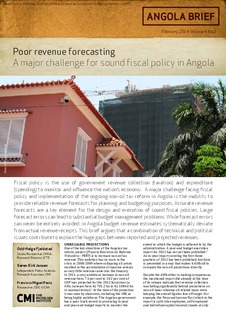| dc.contributor.author | Fjeldstad, Odd-Helge | |
| dc.contributor.author | Jensen, Søren Kirk | |
| dc.contributor.author | Paulo, Francisco Miguel | |
| dc.date.accessioned | 2018-01-04T08:20:56Z | |
| dc.date.available | 2018-01-04T08:20:56Z | |
| dc.date.issued | 2014-02-01 | |
| dc.identifier | oai:www.cmi.no:5051 | |
| dc.identifier.citation | Bergen: Chr. Michelsen Institute (Angola Brief vol. 4 no. 1) 4 p. | |
| dc.identifier.issn | 1892-3933 | |
| dc.identifier.uri | http://hdl.handle.net/11250/2475156 | |
| dc.description.abstract | Fiscal policy is the use of government revenue collection (taxation) and expenditure (spending) to monitor and influence the nation’s economy. A major challenge facing fiscal policy and implementation of the ongoing non-oil tax reform in Angola is the inability to provide reliable revenue forecasts for planning and budgeting purposes. Accurate revenue forecasts are a key element for the design and execution of sound fiscal policies. Large forecast errors can lead to substantial budget management problems. While forecast errors can never be entirely avoided, in Angola budget revenue estimates systematically deviate from actual revenue receipts. This brief argues that a combination of technical and political issues contribute to explain the huge gaps between reported and projected revenues. | |
| dc.language.iso | eng | |
| dc.publisher | Chr. Michelsen Institute | |
| dc.relation | Angola Brief | |
| dc.relation | 1 | |
| dc.relation.ispartof | Angola Brief | |
| dc.relation.ispartofseries | Angola Brief vol. 4 no. 1 | |
| dc.relation.uri | https://www.cmi.no/publications/5051-poor-revenue-forecasting | |
| dc.subject | Angola | |
| dc.title | Poor revenue forecasting: A major challenge for sound fiscal policy in Angola | |
| dc.type | Report | |
